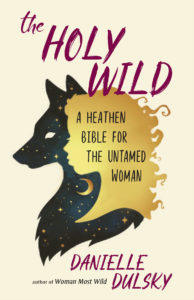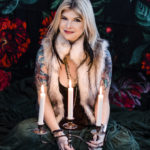
Finding Your Story in the Holy Wild
 Can you imagine stepping into the wildness of who you are, claiming your deepest essence and honoring your life story while spiritually connecting to nature’s elements?
Can you imagine stepping into the wildness of who you are, claiming your deepest essence and honoring your life story while spiritually connecting to nature’s elements?
As a certified creativity and self-empowerment coach, I create safe and sacred space for highly-creative and spiritually-minded women who are ready to discover, empower, and activate their authentic voice and bring it into light – which is why I’ve invited author Danielle Dulsky to join me on my blog today.
Her provocative new book, Holy Wild invites you to create your own spiritual path based on often-suppressed ancient principles and contemporary practices. Using the elements (earth, water, fire, air, ether) rather than traditional patriarchal hierarchies, this “holy book” is designed to connect each individual to their universal — but often denied — powers.
Wild woman Danielle Dulsky takes you deep as she explores and embraces sacred feminine archetypes such as the Mother Goddess, the Crone, and the Maiden. Join her as she guides you to envision and explore a world that enriches and supports your spirit, body, and mind as well as our global community and the Earth.
*********
Why use the word heathen?
The roots of the word heathen run far deeper than its derogatory, godless connotation; it comes from the Germanic word for ‘inhabiting open country or uncultivated land.’ To be heathen means to belong to the wild, to take our lessons from the natural world, and to be nourished by what we fundamentally are rather than what we are told we must be.
Why use the word bible?
The word “bible” originally meant a “holy book” or “collection of sacred writing” of any denomination. It was much later that it began to be associated with just Christian texts. As Danielle explains in the book: “As women of the wild, we deserve our own holy books, our own teaching tales, and our own venerable verses of validation.”
How is the book laid out?
The book is written in five different sections, or chapters — one for each of the elements. Each section is comprised of verses, rituals, and magick. The verses chapters are opportunities for the reader to explore the ways in which the element has manifested in her own story — in her own lived experience — while the rituals and magick chapters are various spells, rituals, and guided meditations for developing a further relationship with that particular element.
Could you give us an overview of the five elements, and how you made use of them in your book?
The Earth element is our ground, the place from where we begin, and is fundamentally linked to our right to be on this planet and in this body. The Water element is our emotions, our sensuality, and our ability to connect the sacred to our feelings and sensations. The Fire element is our crucible, our rage, our activism, and our perpetual hope for a better world. The Air element is our balance and our breath, our relationship to community and the cosmic web.
Lastly, the Ether element is our sacred solitude, our call to honor the ancestors and those who came before us. As in nature, none of the five elements exists in a vacuum. You can’t have fire without air. Water needs earth to hold and contain it. While I do think most people feel a particular kinship with one element over the others, it remains that all five elements exist in our stories somewhere. We just need to hunt for them.
Is this a book only for those who identify as women?
Absolutely not. This book is for anyone who is hungry for the divine feminine, which need not be framed according to deity. Nature is the divine feminine, and Goddess archetypes all over the world reflect this of-the-Earth quality. Because we’re so accustomed to presuming divinity is male, I do use “she/her” pronouns and “woman,” but it’s the suppressed feminine we’re after, not “femaleness.”
In your book, there’s a lot of talk of “magick” (with a “k”). Is there a simple definition for magick?
At its heart, magick is a conversation with the Mystery: the cosmic infinite or whatever force might be out there, whether you call it “God/Goddess” or by any other name. In this important conversation, we find out what kind of world we hope to create and leave behind for the children of the future.
A significant part of the book offers the reader a chance to write their own “verses” and stories. Why is this so important?
I’m a huge fan of personal myth-writing as a means of making sense of life’s experiences. When we write and tell our own stories in an intentionally new way, we almost always glean some important piece of knowledge or wisdom we may not have noticed before. When we do this, we find that many of the answers we’re looking for are right there in our own lived experiences, and I think that any truly “holy book” will permit those who read it a chance to become a part of it. This is the “embodied spiritual” – the practice of feeling, sensing, and naming the sacred with the body rather than merely the mind.
# # #
 Danielle Dulsky is the author of The Holy Wild and Woman Most Wild. She is an artist, yoga teacher, energy worker, and founder of Living Mandala Yoga teacher training programs. She leads women’s circles, witchcraft workshops, and energy healing trainings and lives in Phoenixville, Pennsylvania. Find out more about her online at LivingMandalaYoga.com.
Danielle Dulsky is the author of The Holy Wild and Woman Most Wild. She is an artist, yoga teacher, energy worker, and founder of Living Mandala Yoga teacher training programs. She leads women’s circles, witchcraft workshops, and energy healing trainings and lives in Phoenixville, Pennsylvania. Find out more about her online at LivingMandalaYoga.com.


2 Comments
Kathy DiMeglio
I love the idea of finding the “Wild” within and allowing it to be our ultimate bible! Amen!
Thanks for sharing this amazing review of this book and this brilliant writer.
Nicole
Thank you for sharing your wisdom and this book with us.
I know for me writing was a big part of my own personal story out of depression and the trauma of abuse. I love how she brings it all together with the elements of nature.
Sounds like a wonderful book!